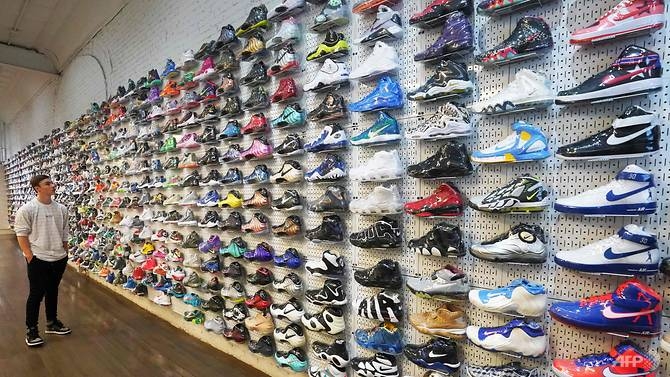Luxury sneakers: High style and a booming market
 |
| A shopper looks at sneakers at Stadium Goods on Jun 6, 2018 in New York. (Photo: AFP/Don Emmert) |
Maxance, who just turned 14, asked his parents for an US$800 pair of Adidas shoes for his birthday. He did not get them.
"We live in a world where sneakers are basically works of art," the teenager said.
The world is also one in which luxury sneakers - often limited-edition collaborations between the big names in sportswear and fashion labels, rappers or famous athletes - have become coveted accessory for everyone from tween boys to middle-aged men.
Some pairs fetch tens of thousands of dollars - the super-rare Derek Jeter Air Jordan 11, named for the New York Yankees superstar, were going for about US$50,000 in recent weeks. Only five pairs were released.
Such shoes are bought second- or third-hand, mainly on the internet but also in chic boutiques or pop-up stores, packaged in plastic wrap to protect them.
New York is one of the capitals of this flourishing high-end sneaker culture, though the trade in trainers is hardly new.
It began in the 1990s - when Nike made it big with the first Air Jordans, made for the legendary basketball star Michael Jordan, those shoes quickly became must-have collector's items.
Then in the 2000s, the market grew as the internet boomed, especially on auction sites like eBay.
JUST PART OF THE MARKET?
Today, boosted by celebrities, social media influencers and the mainstream influence of rap culture, the sneaker biz has gone global. It's particularly big in the United States, Europe and Asia.
Since 2016, it even has its own "stock exchange" - the StockX website.
Matt Powell, a sports industry analyst for the NPD Group, says the actual size of the luxury sneaker market is hard to estimate, but one thing is clear - "that market has had nice growth."
Even if it's centered on a few key industry players, the market is fed by a mass of small-time vendors - many of them sneaker addicts themselves looking for a quick way to make extra cash.
"Estimates of the resale market is that it's at one billion dollars," Powell says, explaining that it's still a "pretty small sliver" of the overall athletic shoe market, which hit US$38 billion in the United States in 2017, and US$100 billion worldwide.
But for John McPheters, the president and co-founder of Stadium Goods - mainly a web business, but which opened what has become one of New York's most popular sneaker stores in Soho in late 2015 - these estimates are way too low.
Stadium Goods sold more than US$100 million in shoes last year, McPheters says. And sales have at least doubled this year, in what he says is a healthier market now that certificates of authenticity have become the norm.
"What we are doing today is really just scratching the surface of what is going to be an even bigger business in the years to come," the 38-year-old says.
WHAT ABOUT WOMEN?
The future plans of McPheters and Stadium Goods are a good indication of the luxury sneaker market's potential and worldwide appeal.
While internet sales account for 90 per cent of the firm's total for now, they plan to open several more actual stores in the US and abroad.
China is its largest market outside the US, followed by Britain and Canada, McPheters explains.
Thanks to a partnership with Britain-based online fashion platform FarFetch, Stadium Goods is hoping to soon break into the Russian market.
Matt Troisi, 29, is a regular customer at Stadium Goods - he owns about 300 pairs of sneakers - and an experienced buyer and seller online. He is convinced the market is huge and about to explode.
Troisi says he earns US$25,000 to US$35,000 a year in the sneaker trade - about half of what he makes as a manager for the Tao restaurant group, where he rubs shoulders with celebrities who help him get access to limited-edition treasures.
"Men - sometimes we don't have the best fashion. We don't really know what the cool stuff is," Troisi says.
"We can wear all black and have no style whatsoever in clothing and just throw on a cool pair of sneakers and that's your outfit!" he adds with a laugh. On his feet? A pair of Nikes marking the 1969 Moon landing that are worth about US$1,000.
McPheters says one key to the future growth of the luxury kicks business will be to attract more women.
"That's one of the problems in the industry, one of the areas brands need to focus on," he says.
"For a long time, brands have tried to entice female sneakerheads with pink laces, and 'feminine' colors while in reality, women want the exact same products as men do," he adds.
"Over the next few months, we're working on some innovative ways to better present our products with women in mind."
What the stars mean:
★ Poor ★ ★ Promising ★★★ Good ★★★★ Very good ★★★★★ Exceptional
Related Contents
Latest News
More News
- Vietnam sets ambitious dairy growth targets (February 24, 2026 | 18:00)
- Masan Consumer names new deputy CEO to drive foods and beverages growth (February 23, 2026 | 20:52)
- Myriad risks ahead, but ones Vietnam can confront (February 20, 2026 | 15:02)
- Vietnam making the leap into AI and semiconductors (February 20, 2026 | 09:37)
- Funding must be activated for semiconductor success (February 20, 2026 | 09:20)
- Resilience as new benchmark for smarter infrastructure (February 19, 2026 | 20:35)
- A golden time to shine within ASEAN (February 19, 2026 | 20:22)
- Vietnam’s pivotal year for advancing sustainability (February 19, 2026 | 08:44)
- Strengthening the core role of industry and trade (February 19, 2026 | 08:35)
- Future orientations for healthcare improvements (February 19, 2026 | 08:29)

 Tag:
Tag:




















 Mobile Version
Mobile Version